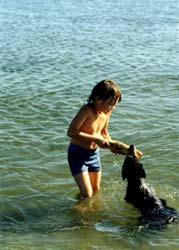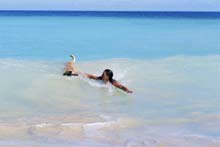Watch Out for These 9 Top Warm Weather Pet Poisons
by www.SixWise.com
Common products that you use in your home on a daily basis can cause serious harm and even death to your beloved cat or dog. Pet poisoning is actually very common, and the American Society for the Prevention of Cruelty to Animals’ (ASPCA) Animal Poison Control Center had more than 140,000 cases of pet poisoning in 2009.
|
Give Your Pet the Longest, Healthiest, Happiest Life Possible

Choose healthy, natural pet food and treats from GreenerWiener.com!
You’ll save money on vet bills while keeping your cat or dog healthy and strong.
Visit GreenerWiener.com now to view their unique line of all-natural pet products to enhance the health and well-being of your furry little ones.

|
With the spring and summer months, the warm weather brings with it a unique set of pet poisoning risks to watch out for. This season, keep your furry family members safe by first getting informed and then making a quick sweep of your home and yard to remove any potential pet dangers.
9 Warm Weather Pet Poisons
The following pet hazards are most common in the spring and summertime:
1. Animal Toxins (toads, insects, spiders, snakes and scorpions)
Snake bites are most common between March and October, according to ASPCA, and if the snake is venomous a bite can be fatal. Other animals and insects, including toads, spiders and scorpions, can contain toxins that are fatal to pets if ingested or stung.
2. Pond, Stream and River Water (Blue-Green Algae)
If you like to take your dog for romps in the forest preserve, make sure he doesn’t drink any stagnant water from a pond. This can contain blue-green algae, which can lead to severe liver and neurological damage in dogs, and it may be fatal.
A side risk of letting your dog drink water from ponds or lakes is that they’re often contaminated with parasites, bacteria and fungus that can lead to infection. Most at risk are ponds that contain warm, stagnant water, but to be safe you should bring your own water supply with you and discourage your dog from drinking out of any pond, lake, river or stream.
3. Salt Water
If you take your dog for swims in the ocean, be sure he doesn’t ingest the water. Too much salt water can quickly raise blood sodium levels to a point that causes neurological problems and even death.
4. Citronella Candles and Oil
Citronella candles are great for keeping pests away, but if your pet ingests citronella it can lead to stomach irritation and or central nervous system depression. It’s best to keep all citronella-containing products (and all candles) safely out of your pet’s reach.
|

If your dog enjoys swimming in the ocean, make sure she doesn’t drink the water, as salt water can lead to neurological damage and death in pets.
|
5. Fertilizers
The ASPCA received over 2,300 calls related to fertilizers exposure in 2009, so think twice before applying these chemicals in areas where your pet will roam. Fertilizers can cause severe stomach problems and gastrointestinal obstruction if ingested by your pet.
6. Pool and Spa Chemicals
The chemicals you use to keep your pool sparkling clean can cause chemical burns, stomach upset, depression, and breathing troubles for your pets. If your pet ingests an undiluted pool chemical, it could also potentially lead to a puncture in his gastrointestinal tract that is life threatening. So be sure to keep all pool chemicals in a safe location, and do not leave open containers out on your patio.
7. Cocoa Mulch
Cocoa bean mulch is sold at many garden supply centers. However, if your dog ingests large amounts of this mulch it could lead to poisoning similar to what occurs if your dog eats chocolate. According to the ASPCA, “In cases where very large amounts of mulch have been consumed, muscle tremors or other more serious neurological signs could occur.”
So it’s best to avoid cocoa mulch in your garden entirely, especially if you know your dog has a tendency to nibble on things he finds in your yard. As its name implies, cocoa mulch has a sweet smell that many dogs find irresistible.
8. Fly, Slug and Snail Baits
Snail bait with metaldehyde, fly bait with methomyl, and other forms of pesticides (mole or gopher bait or rat poison) can cause life-threatening reactions if ingested by your pet. Ideally, seek out safe forms of pest control that are not hazardous to pets or people, but if you must use them keep your pet indoors and away from any applications.
9. Plant Bulbs
Spring-blooming bulbs are a colorful way to beautify your garden, but these plants can be toxic to pets. If you dog ingests parts of the plant or bulb it can even be life threatening. For instance:
-
Tulips can cause skin reactions, vomiting and diarrhea
-
Lily of the Valley can lead to vomiting, diarrhea, seizures, cardiac arrhythmia and death
-
Irises can cause sever gastritis, GI ulceration and death
-
Crocus and Hyacinth can lead to vomiting and diarrhea
What to Do if Your Pet Ingests a Poison
If you see your pet eat a poisonous substance, contact your veterinarian, animal emergency center or the ASPCA Animal Poison Control Center immediately. (You can call the Animal Poison Control Center at (888) 426-4435 if you’re concerned your pet ate a poisonous substance. There will be a $65 consultation fee for the call.)
If your pet is displaying signs of poisoning, such as seizures, losing consciousness, difficulty breathing, etc. don’t wait … get to your local vet or emergency clinic as quickly as possible.
Recommended Reading
How to Save Money on Vet Care: 5 Key Tips
16 Signs to Seek Immediate Emergency Care for Your Pets
Sources
ASPCA.org Top 10 Pet Poisons of 2009
ASPCA.org A Poison Safe Home
PetInsurance.com
ASPCA Winter 2007, page 17
Toxicology Brief “Spring-Blooming Bulbs: A Year-Round Problem